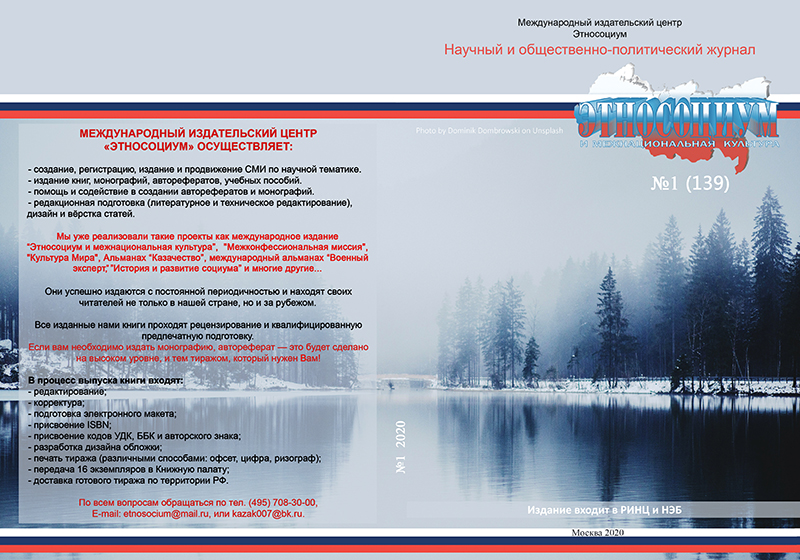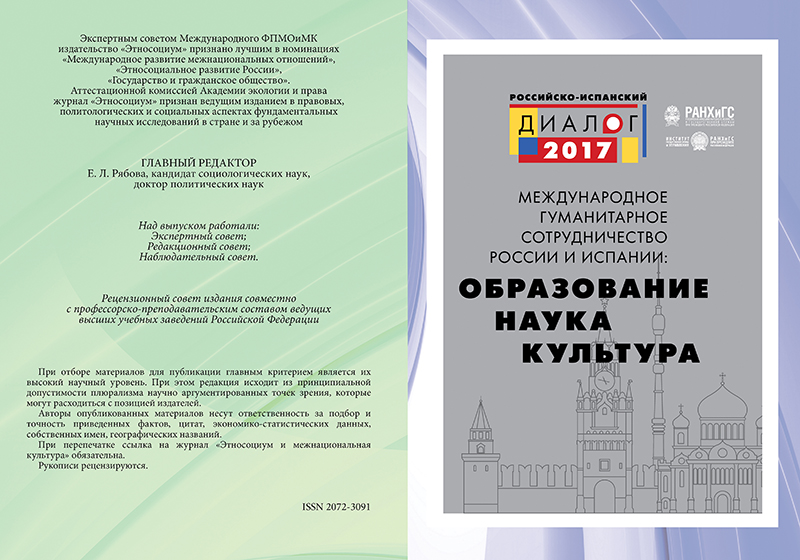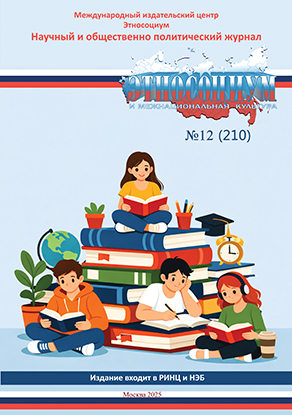- Анонсы журнала "Этносоциум"
- Журнал Межконфессиональная миссия
- Альманах Крым: экономика, инновации
- Журнал Культура мира (Cultural World)
- Анонсы книг
- Италия
- Статьи
- Альманах Казачество
- Власть истории – История власти


Содержание
|
СОВЕТ ПО МЕЖНАЦИОНАЛЬНЫМ ОТНОШЕНИЯМ ПРИ ПРЕЗИДЕНТЕ РФ
|
|
|
Суздалева Т.Р., Сивова А.Н. Информационная война: этапы трансформации
|
9
|
|
АКТУАЛЬНЫЕ ПРОБЛЕМЫ СОВРЕМЕННОГО ОБЩЕСТВА
|
|
|
Вознесенский И.С. Темпоральная компонента организационной культуры
|
20
|
|
Хитарова И.Ю. Организация коммерческих услуг в сфере дополнительного образования при работе с иностранными учащимися
|
29
|
|
РЕГИОНАЛЬНЫЕ ИССЛЕДОВАНИЯ
|
|
|
Гребенюков В.И., Шуляк Т.И. Некоторые проблемы использования культурно-исторического наследия в просветительской деятельности
|
34
|
|
Кабылинский Б.В. Аксиологические паттерны в современной конфликтной реальности
|
45
|
|
Кожокар В.А. Из истории начального этапа формирования научно-фондовой работы музеев казахстанского Прииртышья
|
52
|
|
Арчакова Н.О., Вульфович Р.М. Социальный контур в реализации жилищной политики региона
|
61
|
|
Байханов И.Б. Государственная политика как фактор развития национальной образовательной системы: базовые аспекты
|
69
|
|
МЕЖДУНАРОДНЫЕ ОТНОШЕНИЯ
|
|
|
У Цзюнь Геополитическое положение в регионе Закавказья и крупные региональные акторы
|
78
|
|
Бажора А.Ф. Гагаузская идентичность в республике Молдова
|
89
|
|
РЕЦЕНЗИЯ
|
|
|
Наумова Г.Р. Традиции изучения региональных тем в истории
|
98
|
|
Аннотации
|
108
|
|
Авторы
|
117
|
|
Требования к материалам, представляемым в международное издательство «Этносоциум»
|
119
|
СОВЕТНИК
Белоусов А.Р., Помощник Президента Российской Федерации по экономическим вопросам, доктор экономических наук, профессор.
ГЛАВНЫЙ РЕДАКТОР
Рябова Е.Л., доктор политических наук, кандидат социологических наук, профессор.
РЕДАКЦИОННЫЙ СОВЕТ
ВЕДУЩИЕ РОССИЙСКИЕ УЧЕНЫЕ
Озеров В.А., кандидат юридических наук, Представитель от законодательного (представительного) органа государственной власти Хабаровского края, депутат Законодательной Думы Хабаровского края шестого созыва на непостоянной основе.
Зорин В.Ю., доктор политических наук, профессор, Член Совета по межнациональным отношениям при Президенте Российской Федерации, заместитель директора Института этнологии и антропологии Российской Академии Наук, Член Общественного Совета при Федеральной миграционной службе России.
Михайлов В.А., доктор исторических наук, профессор, Заслуженный деятель науки РФ, заведующий кафедрой национальных и федеративных отношений Российской Академии народного хозяйства и государственной службы при Президенте Российской Федерации, член Совета по межнациональным отношениям при Президенте Российской Федерации.
Болтенкова Л.Ф., доктор юридических наук, профессор, Российская академия народного хозяйства и государственной службы при Президенте Российской Федерации.
Михайлова Н.В., профессор кафедры политического анализа и управления РУДН, доктор политических наук.
Михайленко А.Н., профессор кафедры международной безопасности и внешнеполитической деятельности России Факультета национальной безопасности Института права и национальной безопасности Академии народного хозяйства и государственной службы при Президенте Российской Федерации, доктор политических наук, профессор.
Терновая Л.О., доктор исторических наук, профессор кафедры социологии и управления МАДИ (Московский автомобильно-дорожный государственный технический университет).
Власов В.И., доктор юридических наук, профессор, Российская академия народного хозяйства и государственной службы при Президенте Российской Федерации, Государственный советник Российской Федерации 3 класса.
Гайдук В.В., доктор политических наук, кандидат юридических наук, профессор кафедры философии и политологии ФГБОУ ВО «Башкирский государственный университет», эксперт Российского общества политологов.
Стаськов Н.В., доктор политических наук, Генерал-лейтенант, военно-политический эксперт.
Летуновский П.В., доктор политических наук, кандидат исторических наук, заведующий кафедрой гуманитарных и социально-экономических дисциплин Военной академии войсковой ПВО Вооруженных Сил РФ имени маршала Советского Союза А.М. Василевского.
Игнатов И.С., кандидат политических наук, старший советник юстиции.
Нечипоренко В.С., доктор исторических наук, профессор Российской Академии народного хозяйства и государственной службы при Президенте Российской Федерации.
Пономаренко Б.Т., доктор исторических наук, Заслуженный работник высшей школы РФ, профессор Российской Академии народного хозяйства и государственной службы при Президенте Российской Федерации.
Иларионова Т.С., доктор философских наук, профессор Российской Академии народного хозяйства и государственной службы при Президенте Российской Федерации, генеральный директор Института энергии знаний.
Кондрашихин А.Б., доктор экономических наук, профессор, профессор кафедры экономики и менеджмента, Институт экономики и права (филиал) ОУП ВО «Академия труда и социальных отношений» г. Севастополе.
Фотина Л.В., доктор экономических наук, профессор кафедры государственной службы и кадровой политики Института государственной службы и управления Российской академии народного хозяйства и государственной службы при Президенте Российской Федерации, Советник Российской Федерации 2 класса.
Абрамов В.Л., доктор экономических наук, главный научный сотрудник Центра исследований международных экономических отношений Финансового университета при Правительстве Российской Федерации; профессор кафедры “Государственное регулирование экономики” института государственной службы и управления Академии народного хозяйства и государственной службы при Президенте Российской Федерации, академик РАЕН.
Бахарев В.В., доктор социологических наук, профессор Белгородского государственного университета.
Данакин Н.С., доктор социологических наук, профессор Белгородского государственного технологического университета.
Никонов А.В., доктор исторических наук, профессор, Государственный советник РФ 1 класса, Московский государственный университет имени М.В. Ломоносова.
Ремарчук В.Н., декан факультета «Социальные и гуманитарные науки» Московского государственного технического университета имени Н.Э. Баумана, доктор философских наук, профессор.
Бормотова Т.М., доктор социологических наук, Всероссийский научно-исследовательский институт МВД России, главный научный сотрудник научно-исследовательского центра №1.
МЕЖДУНАРОДНЫЙ СОСТАВ
Дон Ансельмо Сантос, доктор политических наук, профессор, г. Мадрид.
Добров П.В., доктор исторических наук, профессор, академик и член президиума Украинской академии исторических наук, декан исторического факультета Донецкого национального университета, Заслуженный работник образования Украины.
Бирюков С.В., доктор политических наук, профессор, школа современных международных и пространственных исследований Восточно-Китайского педагогического университета (г. Шанхай, КНР).
Солонин К.Ю., доктор философских наук, Профессор Санкт-Петербургского государственного университета, Профессор Института китайской классики Народного университета Китая. Пекин.
Маурицио Негри, президент Союза фольклористов Италии, член Организации Объединённых Наций по вопросам образования, науки и культуры (ЮНЕСКО).
Хорхе Марти Мартинес, Чрезвычайный Полномочный Посол.
Грэм Стоуэрс, политолог, эксперт, Великобритания.
Гюльзар Ибрагимова, доктор политических наук. Профессор Университета Нигде Омер Халисдемир, отделение Политологии и Международных Отношений Факультета Экономических и Административных Наук. Турецкая Республика.
Хикмет Кораш, профессор Университета Нигде Омер Халисдемир. Турецкая Республика.
Abstract
Suzdaleva T.R.
Sivova A.N.
Information warfare: stages of transformation
The article deals with the Genesis of information wars: from the beginning to the XXI century. The specificity of their types (verbal, paper, technical, telecommunication) is shown. Special attention is paid to the analysis of the current stage of the information war and various methods of their impact.
Keywords: information warfare, information weapons, cyberwarfare, technologies.
Voznesenckiy I.S.
The temporal component of organizational culture
Under the influence of scientific, technical and informational changes, time has become a main vital resource. The time factor plays a decisive role in the economy, responding to the underlying needs of the human-oriented organization of labor. Research in this direction has covered a number of sciences. The result of their efforts was the emergence of time management. His methods come from the obligatory consideration of personal types of time perception, generally reduced to linear, parallel and cyclic types. The article reveals the main characteristics of the types of temporal perception, which directly affect the organizational culture.
Keywords: time, labor organization, time management, organizational culture, typology, temporal perception.
Hitarova I.Yu.
Organization of commercial services in the field of additional education in higher education working with foreign students
The article is devoted to the problems of the organization of commercial services in the field of additional education in higher Education working with foreign students. The analysis of typical problems connected with this sphere of activity is made.
Keywords: Additional educational activities, commercial activities in the University, UNIVERSITY, University, actual problems of the organization of the University, foreign students.
Grebenyukov V.I.
Shulyak T.I.
Some problems of using cultural and historical heritage in educational activities
Any topic cannot be addressed without taking into account the views of leading figures and specialists who form policies in this area. This is why the article refers to the events that defined the strategy of the industry for many years. In the issue raised, the Round Table of the Federation Council of 2004 was such an event. The message to this article was expressed by Dementieva M.L. the former First Deputy Minister of Culture of the Russian Federation at the time on the need for broad educational activities in the field of preservation of historical and cultural heritage. Any education involves the selection of information. The selection of reliable information is impossible unless the problem of publication lighting of materials obtained both as a result of archaeological excavations and exploration is solved. Just a brief analysis of the state of affairs in this area shows deplorable results.
Meanwhile, the comprehensive publication of materials in the form of a report will allow not only for broad discussions of professionals, but also allow everyone to adequately assess their abilities to work in a complex branch of knowledge. Such publications will also be invaluable for teachers of history, local history, museum workers. Equally important is such an approach for popularization of knowledge about the past in visual form, artists, specialists of decorative and applied profile.
Perhaps one solution could be to publish field research reports and post them on websites. Such work does not require serious financial costs, archeologists submit reports to the Institute of Archaeology of the Russian Academy of Sciences in electronic form. It remains to make the reports available to everyone. Only the body responsible for the preservation of cultural heritage, the Ministry of Culture of the Russian Federation, can decide who and how to do.
Keywords: cultural and historical heritage, educational activities, Archaeological monuments, Nizhnevartovsky district, Khanty-Mansi Autonomous District - Ugra, publication lighting, profession "archeologist".
Kabylinskii B.V.
Value patterns in modern conflict reality
Within this article author concentrates on researching the value patterns in the conflict reality due to use of potential of philosophical scientific knowledge. The article describes ontological characteristics of patterns in the conflict reality and related transformations of culture modalities in modern discourse.
Keywords: conflict, value, pattern, reality, discourse, existension.
Kojokar V.A.
From the history of the initial stage of the formation of the scientific and stock work of the museums of Kazakhstani Irtysh
The article considers the forms of scientific and stock work of the museums of Kazakhstani Irtysh at the initial stage of their activities. The goals, objectives, regional features of this area of museum work are determined. The difficulties associated with the lack of trained personnel, specialized repositories, the process of documenting, counting and inventorying incoming exhibits are noted. The author determines the similarity of the situation in the industry for all museums in the region. The work is based on current research by museum specialists and extensive archival material.
Keywords: Kazakhstan, the history of the development of museum business, museum, stock research, Semipalatinsk, Pavlodar, Ust-Kamenogorsk, Irtysh.
Archakova N.O.
Vulfovich R.M.
The social contour in the implementation of the housing policy of the region
To date, the housing problem in the regions of the Russian Federation is one of the most urgent, especially for young families and citizens in need of social protection. It is the social aspect of housing policy that is very important in unstable times to ensure the high level and quality of life of the population. High social significance of housing policy in large cities, it is connected with the fact that housing conditions create the basis for the development of human personality and family, which, in turn, leads to the effective functioning of the entire economy of the subject. In this article recommendations on formation of regional housing policy within its social contour are formulated.
Keywords: right to housing, housing, social protection, public policy, regional management, resettlement, emergency Fund, social and housing policy.
Bayhanov I.B.
State policy as a factor of development of a national educational system: basic aspects
The national interests of Russia in the conditions of the formation of a new geopolitical model of the world are inextricably linked with the formation of the educational system in the country, as the basis for the formation of a new personality and the conditions for inclusion in the paradigm of the modern world order. The problems of the social state and the social market economy are inextricably linked with changes in the educational structure of the state and the formation of state policy in the field of education. The national priorities for the development of Russia by the country's leadership have identified: education, science and innovation, or rather the trinity of these elements, their deep relationship and interdependence. In this connection, systemic changes have begun in Russian education aimed at ensuring its compliance with both the requirements of the innovative economy and the needs of society. The importance of education as the most important factor in the formation of a new society is increasing.
Keywords: state policy, educational system, innovativeness, quality of education, political influence.
Wu Jun
Geopolitical situation in the Transcaucasus region and major regional actors
This article considers the geopolitical situation in the Transcaucasus region, analyzes the positions of major regional actors in relation to the countries of the region: Russia, Turkey and Iran. Russia considers Transcaucasia as a buffer zone and the external borders of the CIS; the loss of control over the region may affect Russia's national security. Turkey is trying to strengthen its influence in the region by implementing joint projects with Azerbaijan and Georgia. Iran needs good neighborliness with the northern countries so that the US cannot threaten Iran’s state security and economy.
Keywords: geopolitics, Transcaucasia, Russia, Turkey, Iran, international relations.
Bajora A.F.
Gagauz identity in the republic of Moldova
This article attempts to cover up to a point the primary identity of Gagauz from the Republic of Moldova, whether it be ethnicity, language, religion or other elements. Theoretically, this investigation is based on the major theories on the identity of Erik Erikson, Peter Dahlgren, A. Touraine, S. Hall, Anthony D. Smith, etc. It is clear that on a smaller scale things are complicated later: for example, the Gagauz identity is differently perceived in the Republic of Moldova, than Russia or Ukraine. And Gagauz's identity today cannot be extended to the past without collision with historical data.
Keywords: the Republic of Moldova, Gagauz people, cultural identity and sociocultural integration, protection, and promotion of the integration of ethnolinguistic groups, people's right to self-determination and territorial autonomy.
АВТОРЫ
Арчакова Н.О. - аспирант. Северо-западный институт управления, Российская академия народного хозяйства при Президенте Российской Федерации.
Бажора А.Ф. - докторант кафедры глобальных исследований Шанхайского Университета.
Байханов И.Б. - кандидат политических наук, эксперт.
Вознесенский И.С. - старший преподаватель кафедры социологии и управления. Московский автомобильно-дорожный государственный технический университет (МАДИ).
Вульфович Р.М. - доктор политических наук, профессор. Северо-западный институт управления, Российская академия народного хозяйства при Президенте Российской Федерации.
Гребенюков В.И. - кандидат исторических наук, профессор кафедры документоведения и всеобщей истории, ФГБОУ ВО Нижневартовский государственный университет.
Кабылинский Б.В. - кандидат философских наук. Приглашенный профессор Тайского Королевского Университета NIDA (Бангкок, Таиланд).
Кожокар В.А. - аспирант кафедры историко-культурного наследия и туризма, Алтайский государственный педагогический университет.
Наумова Г.Р. - доктор исторических наук, профессор кафедры источниковедения Исторического факультета Московский государственный университет имени М.В. Ломоносова.
Сивова А.Н. - студентка 2 курса, Московский государственный технический университет имени Н.Э. Баумана.
Суздалева Т.Р. - кандидат исторических наук, доцент, Московский государственный технический университет имени Н.Э. Баумана.
У Цзюнь - магистрант 2 курса, Факультет иностранных языков и регионоведения, Московский государственный университет имени М.В. Ломоносова.
Хитарова И.Ю. - доктор философских наук, кандидат педагогических наук. Профессор Петербургского государственного университета путей сообщения Императора Александра I.
Шуляк Т.И. - магистрант 2-ый курс, ФГБОУ ВО Нижневартовский государственный университет, гуманитарный факультет, направление «Всеобщая история».
